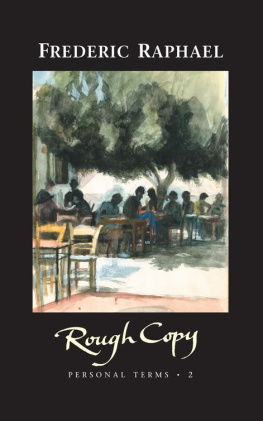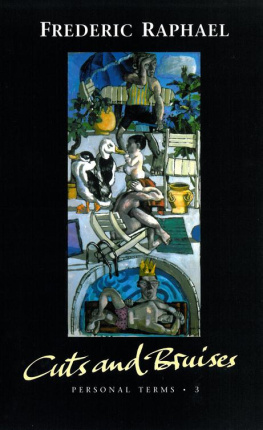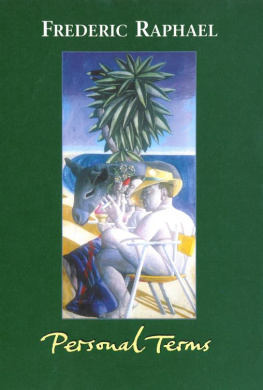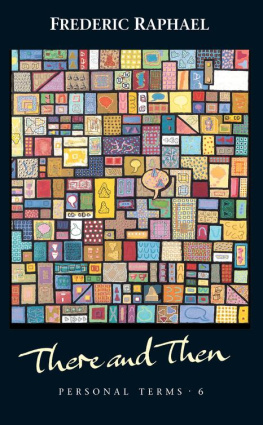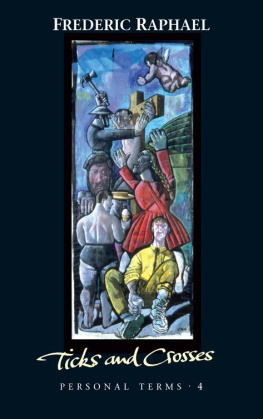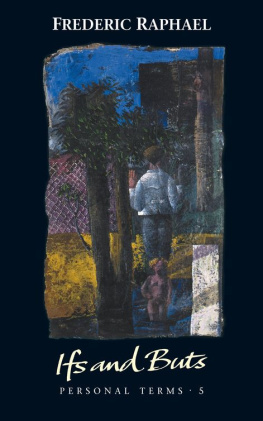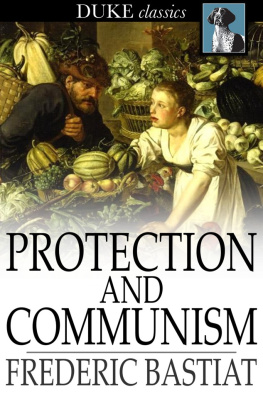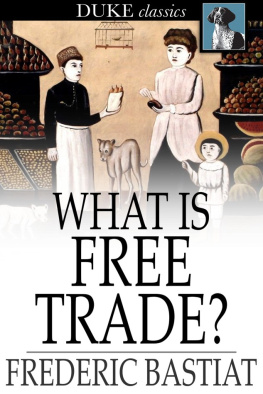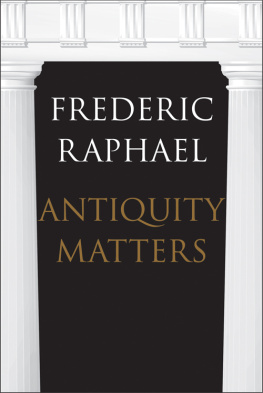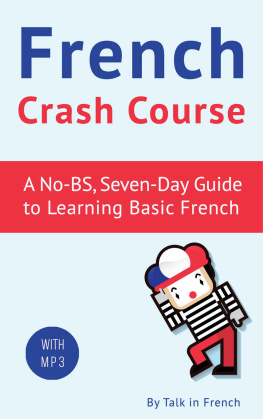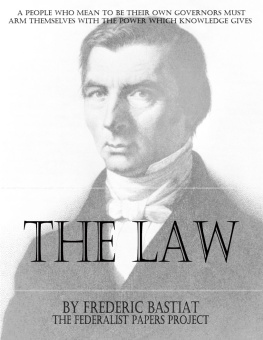My notebooks are neither journals nor diaries: they are insufficiently sententious to be the former and lack the regularity of the latter. They are, quite literally, cahiers, of the same kind that Lycens use. They provide privacy for mental as opposed to physical jerks: where better than an exercise-book to work out, to bend and to stretch and even to fall flat on your face? Their always handwritten contents were never designed for publication. Then why should anyone wish to write for his own eyes in a style sometimes formal and even convoluted? Well, a notebook is a place in which to see what one thinks when there is neither market nor public: they contain a writers letters to himself.
In theory, I was amassing material which, as they used to say, I might later work up into books or stories, but in fact I have seldom gone prospecting for recyclable gold. Although even dead wood can have its uses, part of the fun of being a writer is to tell oneself new stories. Sometimes, however, you can have had a good idea at a bad moment, or a difficult one when you want to take it easy. For instance, I am still planning to write a novel about Catullus which I began, and aborted, rightly, at Cambridge. There are fragments of a renewed attempt at it here.
The first volume of Personal Terms covered the years between 1950 and 1969. I assumed that the second would cover roughly the same span. In fact, I am slightly embarrassed to see, it covers scarcely three years. How should I defend what may read like vain prolixity? The truth is that, during the early 1970s, handwriting was a regular escape from the taints and temptations of the movies and public print. In private (if never in a private language), I could sketch people and things and ideas with no concern for what anyone else might think or say.
When looking through the sketchbooks of our beloved daughter Sarah, Beetle and I have been struck by the meticulous mercilessness with which she observed even the people whom she loved. Her unbounded tenderness and generosity towards others never mitigated Sarahs urge to depict the truth. If these notebooks lack her genius, they echo that same will to accuracy. An artists pitilessness has nothing to do with malice, even though his or her vocation is, literally, to put things down.
As much as possible I have refrained from (or curtailed) introspective entries, but of course my most accessible target is myself. If in the course of depicting others I have supplied a join-up-the-dots portrait of myself, I am willing that it should be as revealing, and as merciless, as any sketch of anyone else. The self-portrait is least interesting when it is a form of self-advertisement. Michael Ayrton once taught Sarah a lesson she never forgot: your best model is your own anatomy. By looking at your own arm, he told her, you have a model for as many arms as Shivas.
I have changed a number of names, both from prudence and to avoid causing what would seem unprovoked distress. In other cases, in particular when fame has affected the subjects features, I have not concealed their identities. What I say about such people is not meant to be wounding, nor yet to raise me to some judicial role. When I pick up my pen, it is as it was when Sarah picked up her pencil or her brush: I write what I see and the pen becomes determinant in how I do it. I am not a camera: the medium affects the message. If what I say about friends, or even enemies, seems unfeeling, I neither apologise nor regret it, though I have no wish to give them pain. That is how they looked and sounded to me. As a writer, that is all I care about.
I began, and continue, with the illusion that my purpose is to tell what truth I can perceive, to pander neither to received ideas nor to editorial or public appetite. My notebooks are my conscience. Where they are callow, I wince; where they are pompous, I groan; where they are painful, I smile; and where they are joyful, I am tempted to cry. The effect of ones work is not part of why one does it.
My editorial principle has been to avoid self-humiliation by correcting spelling and by abating long-windedness and tedium. I have trimmed, but not falsified, and I have avoided smart afterthoughts (except in the rarish form of notes). While I have cut a great deal, I have kept some things in the text despite the sane advice of my wife, my friends (notably George Walden) and my peerless publisher Michael Schmidt. If anything infuriates the reader, that is fine; if it bores him or her, it can be skipped without losing the plot. Like it or not, jy suis, jy reste.
FREDERIC RAPHAEL
Lagardelle, 2004
I trained to London and took the underground to Sloane Square for lunch with Jo Janni and Jonathan Miller. A clear, chilly Chelsea day when my out-of-towners briefcase was a badge of shame. The kids, with their aloof glasses and pale faces, shaggy, long waistcoats, fun furs and unkempt wool, pace about carrying parcels or caressing their loose hair. Urgent loiterers, some of them lounge in the doorways of boutiques where, with a pinch of banality, you realise that they are, in fact, employed.
Despite a dawdle at Wards bookshop, I was first at Au Pre de Nico. Must those who travel furthest always arrive first? I sat in a corner of the no longer popular, no longer cheap restaurant sniffing at Encounter, now a pressed, unseasonable flower. An article on Oswald Mosley had snared me. Jo arrived in a neat, dark grey suit; white flesh bulbous under Huntsmans cloth; self-conscious with his first, black-rimmed, glasses. Had I ever had to wear them? My denial aged him. He had gone to Wales the previous day, but it was too fine for sport: the fish could see the cast and the shadows.
Dr Miller, rusty rather than red, bulked out in unfashionable gear, loomed over us with important shyness. He asked at once for cigarettes. I remembered him too barefooted and boyish for such urbanities. We practised a few philosophical falls and found we could still slap the mat with the old huggerhah. So: why had he in mind to do The Portrait of a Lady?
Vanity had brought him unprepared to discuss his own idea. I covered for him by asserting the essential cohesion of Jamess novel, saying as if it were well-known that it was a mistake to suppose that the suitors whom Isabel Archer rejected would have been any more suitable than Gilbert Osman. All were impersonations of her various delusions: the theme was not as Jonathan had proclaimed the corruption of American virtue by European guile, but misconceptions born of the proud humility with which Isabel herself approached the experience of Europe.
When Jo looked dubious about the project, Jonathan paraded other ideas. He had the eagerness of a variety artist who, finding you dont want a comic, confesses that he has always preferred juggling. How about The Golden Bowl (which I doubted that he had read) and/or Kafkas Amerika? Set in England, of course.
Bragging of his victimisation by Hal Chester, who produced Take a Girl Like You, his sole commercial credit, Jonathan disclosed that the picture had been taken away from him entirely, and re-cut. Hearing that Chester had even re-shot behind his back, I saw a director neither trusted by his associates nor sure of himself. He revealed self-doubt which doctorate, curly-headed fame and cosmopolitan connections were usually patched together to obscure: having failed to make a fool of Hal C., he remained too raw for reticence. Were it not for the big play he is able to make with Larry, whom he is soon to direct at the National, Dr Miller would now be threatening to return to medicine.

